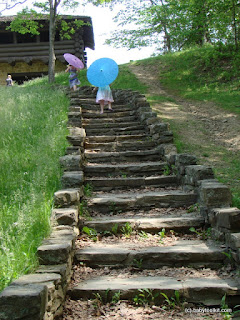 In my grandma's basement, green-covered Nancy Drews shared a shelf with the Hardy Boys. Time-crisp dust jackets broke at the creases as if they could no longer contain the adventures of 1950s and '60s kids' pulp. The Bobbsey Twins cheerfully solved crimes while hero dogs saved hapless humans time and time again. I don't think there was any book considered a classic on those shelves. My brother and I read them at every opportunity. They may not have been Choose-Your-Own-Adventures, but I marveled at sixteen-year-old Nancy's blue roadster, keen eye and seemingly limitless freedom.
In my grandma's basement, green-covered Nancy Drews shared a shelf with the Hardy Boys. Time-crisp dust jackets broke at the creases as if they could no longer contain the adventures of 1950s and '60s kids' pulp. The Bobbsey Twins cheerfully solved crimes while hero dogs saved hapless humans time and time again. I don't think there was any book considered a classic on those shelves. My brother and I read them at every opportunity. They may not have been Choose-Your-Own-Adventures, but I marveled at sixteen-year-old Nancy's blue roadster, keen eye and seemingly limitless freedom.At my small country grade school, the classics stood shoulder-to-shoulder waiting to fill any unoccupied student minute. Twain and Dickens were some of my favorites. These school's books also came from the years preceding mass market paperbacks.
Books seemed ageless. Of course I felt the distance of the years when reading, but the stories still breathed.
Even after weeding out the obvious twaddle, many books I loved did not stand up to the years when I tried to read them with our kids. And a few that they do like, I now actively dislike.
At present, the kids are obsessed with Encyclopedia Brown audiobooks. We listen to them in the car, the kids rapt in the riddles while Jim and I quietly snark about Idaville being the worst town in America. Despite a high case closure rate, crime is unusually high in Idaville. A known public menace is allowed to keep creating problems with no real consequences. Gambling and theft are high. People hide out from thugs. And worst of all, the police chief relies on his child to solve the crimes.
Often the cases are solved by details that are circumstantial at best. When Encyclopedia "proves" Bugs Meany is cheating a younger boy, Encyclopedia declares a letter and check forgeries because they are dated July 31st. While this may have been grand detective work in my childhood perception, an erroneously dated check now seems less like a smoking gun and more like a common paperwork error.
While social changes may make these old books seem outmoded, I'm becoming convinced that the literature of my childhood was inferior. It may have been the literary equivalent of the buddy parent: pandering and lacking complexity.
When I listen to Encyclopedia Brown with my kids, the books operate on a surface level. The heroes don't fear anything, and there's no moral complexity. Encyclopedia pronounces a verdict that everyone accepts no matter how thin the premise. The stories have all the depth and emotional authenticity of a Scooby-Doo episode.
That approach may have been enough when I was a kid, but there are so many better offerings today. I am convinced that children's literature has improved. It respects the young reader with complexity and depth in the stories and their emotions.
As a parent, I really appreciate this shift. I remember reading stories to try and understand the world around me- particularly the parts that adults didn't discuss. When the stories were preachy, prescriptive cautionary tales, they become predictable, relatively worthless and most offensively, not fun.
Accepting the limitations of my childhood favorites allows us to discover together the rich, new world of children's stories. Every parent who once loved Encyclopedia Brown should take the opportunity to Escape from Mr. Lemoncello's Library alongside their kids.
This BAD summer, we'll discuss some of our other new and old family favorites.
Have you revisited your favorites?
How have your favorite books aged?
***Baby Toolkit is a tale told by a Midwestern gaming family, full of books and adventures, signifying something. We just don't know what. We are Amazon affiliates, so a small portion of purchases made through our links goes to pay for our domain name and general upkeep. Be sure to check out our gaming podcast at GreatBigTable.com.



